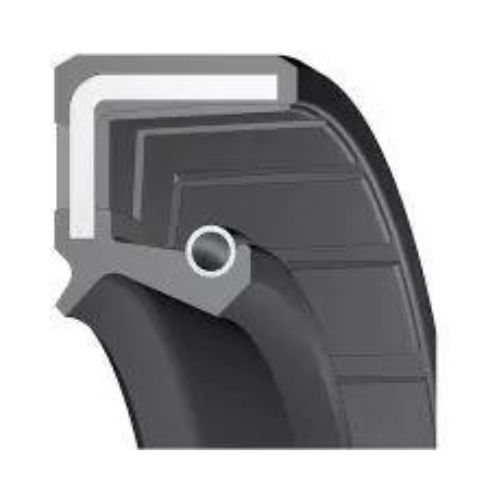What Are TC Oil Seals?
TC oil seals are widely used to prevent oil leakage and protect machinery from dirt and moisture. The "TC" designation refers to a double lip oil seal with a rubber-covered metal insert and a spring-loaded sealing lip. Specifically, the “T” stands for a rubber (elastomer) outer surface, typically made from nitrile rubber (NBR) or FKM for chemical resistance. The “C” indicates a secondary lip, which acts as a dust wiper to keep contaminants out. This TC profile oil seal offers better sealing than single-lip types, making it ideal for demanding rotary applications. The TC oil seal meaning lies in its robust metal insert, versatile elastomer body, and double lip configuration, distinguishing it from other oil seal types that may lack these combined features.
How TC Oil Seals Work?
Understanding how TC oil seals work starts with their double lip design. The primary sealing lip is spring-loaded and maintains consistent contact with the rotating shaft, ensuring effective fluid retention while minimizing friction. It seals against internal fluids like oil or grease, even under low pressure. The secondary lip, or dust lip, faces outward and blocks external contaminants such as dirt or moisture. This oil seal double lip function offers added protection in harsh environments. As the shaft rotates, the elastomer lip—usually made of nitrile or FKM—flexes slightly to maintain the seal. TC oil seals are designed for unidirectional sealing and typically withstand pressures up to 0.5 bar. Their efficient design makes them ideal for rotating applications requiring both internal sealing and external exclusion.
Common Applications of TC Oil Seals
TC oil seals are used across many industries due to their double lip design that protects against dust and retains lubricants like oil and grease. In hydraulic systems and gearboxes, they prevent fluid leakage and keep contaminants out, ensuring long-lasting performance. Agricultural equipment benefits from TC seals in dusty, dirty environments where reliable shaft sealing is critical. Electric motors use them to maintain lubrication and shield internal components from moisture. While automotive applications are a common use case for TC oil seals, especially in engines, axles, and transmissions, our products are specifically tailored for industrial use.
Disclaimer: We do not supply TC oil seals for automotive applications.
Materials and Design Options
TC oil seal materials play a key role in performance. Standard options include nitrile rubber (NBR) for good wear resistance and oil compatibility, and FKM (Viton®) for excellent chemical and temperature resistance. Choosing the right material, nitrile vs Viton oil seal, depends on your application: NBR suits general use, while FKM performs better in high-temperature or aggressive environments.
We also offer TC oil seals in EPDM, HNBR, VMQ (silicone), and ACM, providing options for steam, ozone, or fuel exposure. All our reinforced TC seals feature a metal insert for strength and dimensional stability. These material and design combinations ensure optimal sealing under various operating conditions, from extreme heat to abrasive contamination. Let material choice match your application for longer service life and reliability.
Key Benefits of Using TC Oil Seals
When it comes to reliable shaft sealing, the benefits of TC oil seals make them a top choice in industrial applications. Their double lip design offers significant advantages over standard seals.
- Excellent sealing performance thanks to the spring-loaded primary lip
- Extended service life due to durable materials like NBR, FKM, or HNBR
- Reduced maintenance with long-lasting, leak-free operation
- Resistance to contaminants through an effective dust lip barrier
These features explain why choose TC oil seals for machinery exposed to oil, grease, dirt, or moisture. Whether used in gearboxes, pumps, or electric motors, TC profile seals deliver dependable protection and help reduce downtime, making them ideal for demanding environments where performance matters most.
Comparison with Other Seal Types
Understanding the differences between seal profiles helps in selecting the right solution. In the TC vs SC oil seal comparison, TC seals offer a double lip design for enhanced protection, while SC seals have a single lip, making them more suited for clean environments. The double lip vs single lip oil seal distinction matters: double lip (TC) provides added dust exclusion, extending equipment life.
TB seals are similar to TC but have a metal outer casing instead of rubber, offering better fit in metal housings. A13 seals are compact, single-lip types used where space is limited but with less contaminant resistance.
TC seals are ideal for dusty or oily environments, while SC and A13 work better in cleaner, low-demand applications. Each has its place depending on shaft conditions and sealing needs.
Order your TC Oil-Seals at Oil-Seal-Stocks.com
TC oil seals offer superior sealing performance with their double lip design, durable materials, and resistance to contaminants—making them ideal for gearboxes, electric motors, hydraulic systems, and more. Their versatility and reliability result in extended service life and reduced maintenance, setting them apart from other seal types.
As a trusted oil seal supplier, we provide a wide range of TC seals in various materials and sizes to match your specific needs. Browse our TC oil seal catalogue directly in our oil seal webshop or contact our sales team for expert advice and a custom quote.
Order now via our webshop or reach out for personalised support—we’re here to help you find the perfect sealing solution.







